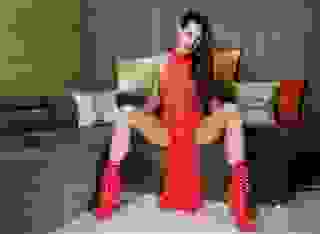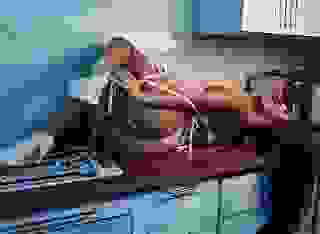Note: You can change font size, font face, and turn on dark mode by clicking the "A" icon tab in the Story Info Box.
You can temporarily switch back to a Classic Literotica® experience during our ongoing public Beta testing. Please consider leaving feedback on issues you experience or suggest improvements.
Click hereThe Lady examines my handiwork, critically, her eyes clearly aimed at the offending undone button. "I could catch cold, you know..."
I reach out and pull the sides of the jerkin towards me, away from her flesh. She rocks forward so far that I think she might topple over on top of me. I swiftly fasten that fourth button and release her so that she settles back on her heels.
"Would you like to sit while we wait, Ma'am? Here, there's a log that you could use."
"No, I would care to stand a little longer, until your horse comes. I er, damn it, you were right!"
"Right?"
"About the road, it is soft on top with hard tree roots criss-crossing the road ..." I must look confused to her as, after her pause awaiting my unforthcoming reaction, she continues, "... the ride was bumpy, continually bumpy, so therefore I would prefer to stand for a while longer."
"Ah," as my comprehension kicks in belatedly.
"Lady Elinor of Pitstone, presently Countess Elinor De La Warre, though not for too much longer I fear."
"What?"
I believe my head must be full of linen lint, as I fail to grasp what she had said, while I was still thinking about that fourth button and her bumpy ride, to the exclusion of all other thoughts or the ability to fully appreciate anything at variance with those thoughts.
"My name is Elinor, Robin. You have introduced your companions and yourself, as travelling archery competitors, and I now introduce myself as Lady Elinor of Pitstone, a parish and manor in the County of Buckinghamshire, near the Vale of Aylesbury, and, presently I am a Countess of Picardy, the Countess Elinor De La Warre.
But my husband is deeply in debt, his bankers worn thin on patience, so he will abandon me here, for the bank of the Red Hand in Brugge, where my dowry is his to claim!"
I am shocked, for the Red Hand bank is where my family banks, in the ownership of our friend Rebecca.
5.
Plans change
(Robin Oaklea, son of Will Archer, narrates)
The Lady Elinor of Pitstone walks for an hour before we emerge from the deeper wood into lighter forest. She complains about it mightily before we mount up, now that the road is better under the horses' hooves. Lady Elinor has to ride on my chestnut bay, with her sat in front of me, and we ride together, in silence. After riding a couple of miles, I get down and walk alongside. She fumes at the loss of speed.
"How will we ever catch up at this rate?" she raves, "if that is still your intention."
"It is. I agreed to take you where you wish to go, madam, but my horse will be damaged carrying us both for any distance and now we are out of the shade it is starting to get hot."
Hugh offers sharing his horse, but she looks down her nose at his scrawny mount, one that the Farrier at Oaklea recently accepted in lieu of a bill. Henry rides on quietly, feeling no obligation to offer his Castle-owned mount, already overloaded enough by his large frame.
"Once we get through the forest," I inform her, "we will be near Coraton, a small town where we will have to spend the night."
"And, through your impetuous intervention, I have no purse..."
"I will settle the inn's rate for the night and hire another horse to take us to the port or buy one if need be, we are still in my father's county, his credit is good here."
"His county?"
"My father Sir William Archer, is the Bartonshire reeve." I tell her. There is little point in hiding such from her, she will know when we arrive at the inn soon enough.
She falls silent and remains so until we stop for lunch on a patch of grass that the sun has dried of dew, near a stream.
"So why are we stopping here for lunch?, when we could press onto..." Her Ladyship's voice falters as she forgets the name of the town I mentioned a moment or two earlier.
"Coraton." I say, "There is a ford over a stream there where we can cross in safety. Beyond the town, the river runs into another river and is then impossible to ford, so the main road remains on the high ground on the left of the stream, which leads onto Hensmere, where the Count will be arriving late this afternoon. Even we didn't stop here, and pressed onto Hensmere, we would arrive there three hours after dark."
"So, there will still be enough night left to sleep if we pressed on into Hensmere?"
"We could sleep fer far longer than a single night, me Lady," Henry speaks up in his gruff voice. "Aye, madam, we could nigh on sleep forever. Nobody but a fool tries to cross Hensmere Marsh for three hours in the dark, without losing the road and drowning in the mere. We be no fools. That area is notorious for quicksand, sometimes people are sucked down for a year or sometimes for centuries, before the deep releases the bodies. They that come up have long been dead but they be so well preserved in yon airless muck, that they look like they've only been but asleep a moment."
I shiver at the thought of drowning. I fell in the leet once as a boy but Hugh, who swims like a fish, leapt in that day to save me. He taught me to swim and, in turn I taught Hugh how to use a bow and arrow to shoot fish. From the evidence of Hugh's bowmanship, he was the better teacher of us both. But fast friends we be since.
So, we stop to eat our lunch, an admittedly rough fare of crumbly dark bread and dried fish, bought cheap from the Wellock Inn. She accepts that we cannot make it to the larger town today, so she finds she has an appetite and eats near all my ration, while I confess I have completely lost any wish to eat.
Hugh decides to start up converse with her ladyship, "So, what manner of man is this husband, who runs from his bride at the first sign of trouble?"
She sits and chews for a moment, reflecting on the question.
"He is old and fat, and lazy, but he was eager in his greed and penny-pinching enough to slip away from the inn without paying his tally, while all were diverted by the fuss and commotion first thing this dawn. I think some misfortune had befallen his family, but a handsome man, who dressed well, departed early before breaking fast, with his messenger I think, giving Count Gervais the opportunity to drag me to his coach and ride off in the other direction."
"What a rat, is your Count Gervais," Hugh comments, "why in Heaven's name did you want to marry him for?"
"Every father wants to see his daughter married off, Master Hugh, preferably to a Duke, but if not then a Count might do at a pinch. I, a lady who respects her father has no free choice in the matter."
Hugh grins and sits by her and they continue their conversation. I slip away from our guest to speak to Henry, who is left to check that the horses are drinking and have spring grass in the shade to chew to supplement the bags of oats we brought all the way from the granary at Oaklea.
"I know what thee's come to say, Master Robin, an' I'm dead agin it. Sir William put me in charge of getting thee to the next two fairs, then back to Bartown in plenty o' time for the Fair there. If'n I don't, he'll have me flogged fer sure!"
I laugh at that, the idea of my father having anyone flogged seems unbelievable. "No, he won't H, I will take full responsibility for this, I know what I am doing—"
"Like back in that wood when thee shot that Count in the arse?!" he says, with a grin as wide as the stream the horses were drinking from.
"It was a natural mistake, Henry," I mutter.
"Aye, lad, it were, an' I daresay I would make the same mistake me'sen, but ye father'd chew me ears for ever."
He chuckles and adds, "but, it were a fair shot lad, I'll give thee that!"
"I made the mistake and I am prepared to pay for it. It was I who robbed her of her happy honeymoon, for I am sure she would have grown to accept the ugly brute in time, so I must be the one who has to atone for the error."
"Happen yer right Master Robin, but I must stay with thee, as Sir William commanded, so it will have to be Master Hugh who will ride home to tell your father where thee's heading."
"Hugh, ride alone? He'll get lost, you know what he is like."
"He'll be fine."
"I will ask him when we start to move on, we can leave the decision until we reach Coraton and the fork in the road."
"In the daylight on the morrow he should find his way back. It will take him two days from Coraton, one and a half days from here."
"Well, he might find his way back here from there, Henry, but through the wood, where the road is washed away in places? No, he could easily take the wrong path."
The path is hard to follow even with Henry as guide.
Mmm, Henry gives me much to ponder as we pack up, saddle the horses and move off down the road. Lady Elinor is sitting behind me, as she says she felt more uncomfortable in front. She has to keep her slender arms around my middle and clenched in front of me. I am clearly more uncomfortable on this leg of the journey.
I confess to myself that I had enjoyed the previous hour that we had ridden together. At the time my mind was numb and I could hardly bare to bear my thoughts on the subject, my horse simply following the others, under little control from me. So then I had concentrated on the trees, a lot of trees, and the birds and every wild thing that stared at us with bright eyes from the hedges and undergrowth beyond the well trod path.
I recall now how every time I looked forward I was looking through a veil of red hair that blew up in my face by the lightest of airs in the stillness under the trees. When the sun started to break through at the canopy opened as we emerged into the forest, the breezes strengthened, almost obliterating my vision. Her smell, too, had enveloped me, as it even does now, a warm body smell, with hints of lavender, that tease my senses like they never have before.
We descend again, down a steep slope and the slight change of gait stiffens her grip, her hands grip my shirt, I feel her shift her position as she peers around me to see what is coming, after some time when she had simply rested her head on the middle of my back between the shoulder blades.
I feel it is time I dismounted and walked alongside.
"Henry, Hugh, wait a moment, I am going to walk awhile and let Lady Elinor stay mounted, I don't want our horses to slip."
"Aye," grunted Henry.
Not a disgruntled grunt, by the look of his face, just one of his usual grunts that simply means he was grunting. I have liked Henry since we met on that fateful night when Sir Giles, the old Shire Reeve, attacked my father with intent to kill both him and the Priest, Father Andrew. Four men died in that room in as long as it takes a scholar to count one to four on his fingers. My father left standing at the end with not a scratch on him. Henry and I were one of the few still around who shared that tense moment after my father, alongside the sword-wielding old Priest, faced the Castle's men at arms, heavily outnumbered, yet asked them to put down their arms and surrender. They not only surrendered, they made him their Reeve! And that appointment was later confirmed by the drunken King Henry himself, who knighted my father with a borrowed sword!
Hugh doesn't grunt, he sighs loudly, as if to opine that the thought of allowing the Lady to ride while the rest of us walk was an unnecessary gesture that was wasted on her exalted selfishness.
While we lead the horses down the steep hill, I edge over to Hugh to speak with him.
"When we get to Coraton," I say, "I will have to travel onto Hensmere, thence the coast and sail to Brugge with Lady Elinor. But someone brave and trustworthy must convey a message to the Castle to warn my father of our new circumstances. Otherwise, when he has finished with this plague business, he'll start searching the country for us and raise hue and cry when we cannot be found where he expects us to be."
Hugh grins, as he always does with 'Hugh An'Cry'. It is the nickname the other Bastards called him when he was little and picked on. He had adopted it immediately, with a huge smile on his face, as if the saying was designed for him. Now his friends, who once called him that behind his back, now more often call him his nickname to his face and all genuinely laugh about it.
"It will be you and I against the world then, Rob, with the Lady of course. What an adventure, what tales we'll tell on our return!"
"No," I say gently, to assuage his hurt, "I was thinking of taking Henry with us, because he has been to the land of the Flemings before, while neither of us have never been anywhere outside of our own shire."
"Oh no, Rob. I'm not going away anywhere but with you. I'm your best friend and I'm going to go to Brugge with you, come hell or high water, and God speed us upon the tide!"
Damn! That is not how I reasoned the conversation would go. How is it that my father can be so persuasive, while I have all the negotiation skills of an ear of corn in the wind?
We remount once the terrain levels out again and the Lady decides she wants to ride up in front of me again. She complains she kept slipping off at the back, which she claimed was vexing. I notice that too, now that she has minded me of it. This morning when I had perched behind her, sitting on the chestnut bay's hind quarters behind the saddle, I could feel exactly what she felt.
Happily, we continue at a relaxed pace though and she actually turns and smiles at me a couple of times, especially after disappearing into the bushes on one stop to relieve herself.
While she is in a brighter mood, I try and strike up a conversation. Like Hugh questioning her earlier, I am interested to know how this arranged marriage came about. She appears to answer mefrankly.
"My mother and father married under the laws of Friedelehe..."
Naturally I have heard of the different wedding types before, as my parents were married first under this law of Friedelehe. It is one of convenience, where no property rights are exchanged. But, however convenient the partnership, the resulting children are wholly legitimate, even if the partners have other legal marriages extant.
I had heard my parents discuss their first marriage one morning while they were at breakfast, when they thought I had not yet arisen from my bed. Intrigued, I had sat in the antechamber of the manor hall to hear their full conversation. My father, Will, was asking Alwen why she had never annulled their marriage in all the time they were apart. She never would give him up, she had assured him, with many kisses, of her eternal fealty towards him. They embraced for so long that I thought I might starve without my breakfast. Alwen told him that they had not married under the usual contract of Muntehe. This, the usual formal and permanent contract of matrimony, involves transfer of property between families.
Although their marriage was indeed a lawful marriage, it was under the lesser law of Friedelehe. Many of this type of marriage are often temporary, Alwen had explained, and without the transfer of property, made them easy to arrange and annul. An older man, still married, but to an infirm or barren wife, might therefore take a second younger wife, either publicly or privately through this law. Any offspring of a Friedelehe are legitimate and are recognised as heirs in the same way as heirs from a Muntehe. So, Will and Alwen's blessing in the Church a year ago, was on their eighteenth wedding anniversary. They read out their marriage vows at the door of the church, and their union became a full Muntehe marriage, for life.
The Lady Elinor continues, breaking into my thoughts, "... my father arranged this marriage to the Count long ago through a broker, but now my father is no more."
"And even though your mother and father were married under Friedelehe, with no property obligations, he still provided a rich marriage gift?"
"Aye, he did."
"What of your estate in ... Pitstone was it? Do you still have family there?"
"Only my mother. She was not originally from those parts. She is of the Elliott clan and came down from Scotland before I was born to settle down in Buckinghamshire. I was born in the village of Pitstone."
"I have never heard of it—"
"It's a tiny place, no-one has ever heard of it. It only has a manor, an Inn and a few rude houses. It is the only place I've known until now."
"Does your mother still live there?"
""Yes, or least close by."
"Your mother didn't come to your wedding?"
"She was not ... er ... well enough to travel."
"So you only had your maid?"
"Yes."
"Margaret, wasn't it?"
"Nearly, Margrett."
"What happened to her?"
"The girl did not meet the Count's approval, was dismissed and sent back to Pitstone."
"Forgive me, my Lady, but you seem to be more a girl my age than any woman of full age."
"I am eighteen, Robin, perhaps a year or two younger than you and a couple of years older than your little friend."
"Ha!" I laugh, "Hugh is the same age as me, we were both born in January within days of each other."
"And how old are you both?"
"Eighteen, the same as you. But you had no family at your wedding, to celebrate?"
"Only my mm ... servant Margrett, she was my witness. And she took the small Bride Price back to my mother when she left."
I had been stoic to the Lady's complaints and criticisms during the early part of our journey. Now she is more expansive, and the exchanges help paint me a picture of her existence, a lady, the only daughter of what must be a fine estate to afford a dowry to attract a Count of the Flemish county of Picardy. But still I am disquiet about the sketchy inconsistencies in her story; the Lady has secrets to unravel. I have never heard of a woman married without her mother and friends to attend her, especially if she is an only daughter, as the only other person she has mentioned is her maid servant, the mysterious and conveniently vanished Margrett.
At the fork in the road, the left would take us north east towards the tournaments, or right will take us east towards the North Sea coast and, hopefully, a ship to Flanders. A decision must be made and our happy band split up as one of us must return as informant of our adventure to William Archer.
6.
Lockdown
(Will Archer narrates)
When I arrive at the Castle in Bartown, it is well into the night, and I am alone. My companion, the poor lad Dick, who was sent as messenger to fetch me from Wellock Brigga, had fallen sick just afore it grew dark. I had let him ride far behind me when we first set out but soon after we left, I deemed this completely pointless; I was already determined to enter the town and from there unto the Castle shortly after arrival, so whatever this sickness was, and it sounded to me like a mortal combination of the Bad Air and the Bloody Flux, I was going to be exposed to its evil ere long.
I instructed Dick to wear a kerchief tied around the back of his head, completely covering his nose and mouth, and I wore one too, as I was sure that I would pick up the sickness soon. Being only a young man, who wanted more than anything to be a marching soldier, he obeyed his Reeve without question and wore it all day, only moving it up out of the way when he was ill with the flux, which he indeed was, not above halfway through the day.
I remembered all too clearly during my time spent in armies of war, marching or training for the fight in France and its duchies. That which they called the Mal Aria could be spread by breathing in the bad smells of sickness.
We had this in England, particularly in Kent County and Sussex, especially where the land was marshy and warmed in the Summer, but it was always naught but a mild ailment in our part of the kingdom of England and Normandy. The version found deeper in France was different, nastier and it killed men that hadn't caught it before. Where it didn't kill outright, it often afflicted people from time to time throughout their lives even after they returned to the cold climes England.








